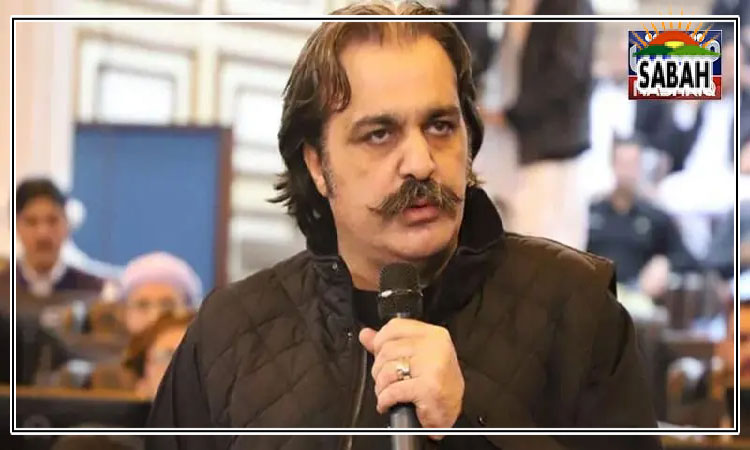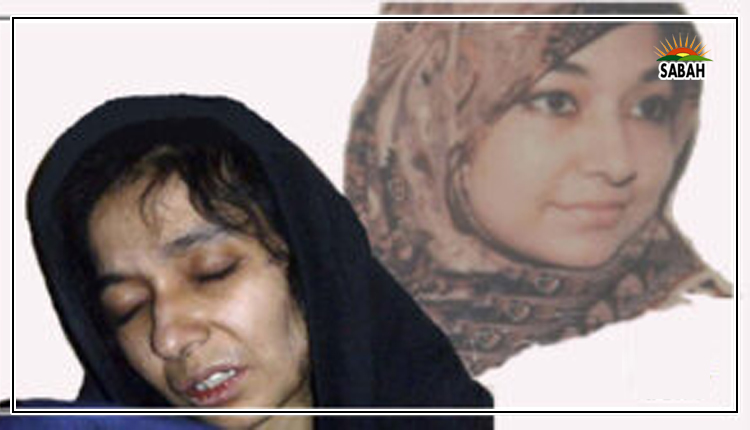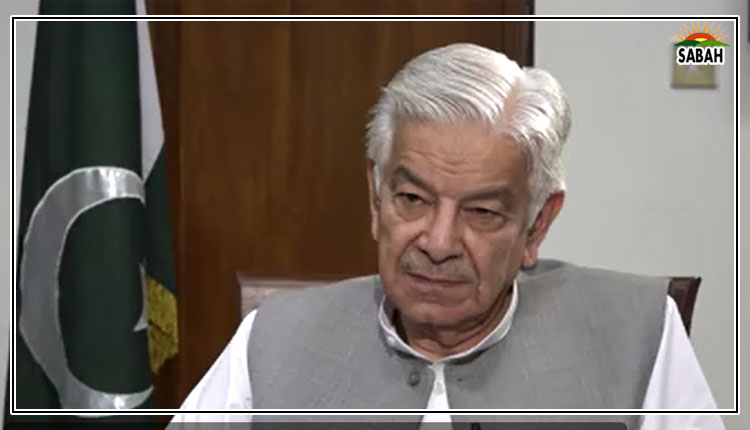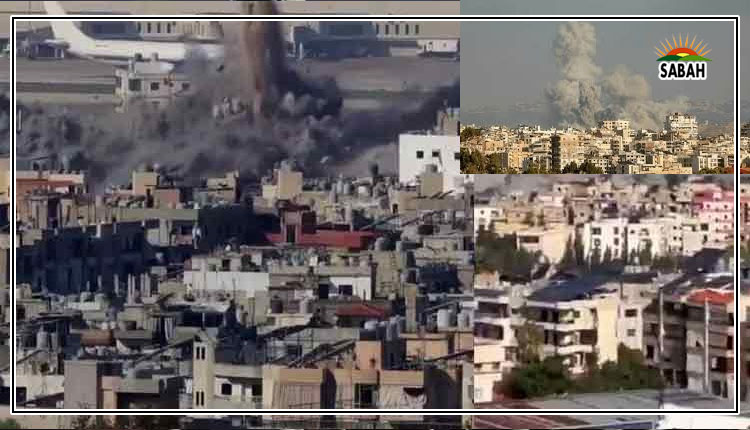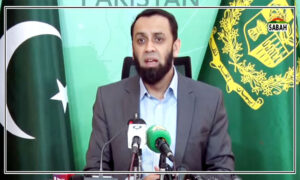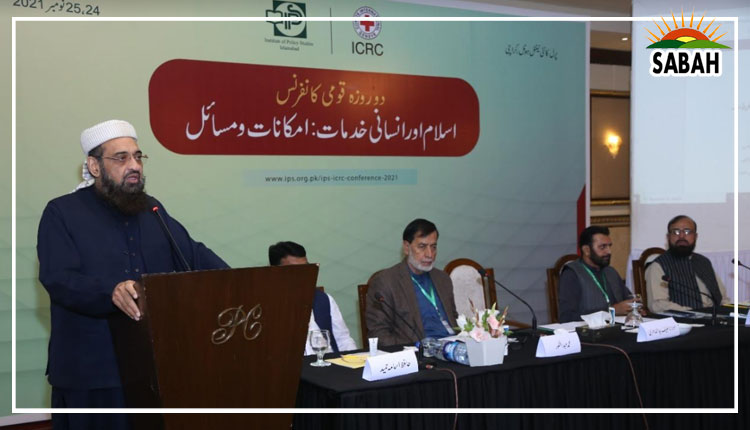Human compassion & service to people is central to Islam, say Speakers at two-day national conference organized by ICRC & IPS
KARACHI, Nov 25 (SABAH): Humanitarian actions and services form the very core of Islamic philosophy and principles and this is not only evident from the commandments of Allah and the teachings of Quran, but also manifested by the Prophet Mohammad (PBUH) via his actions throughout his life.
These views were expressed by Maulana Hanif Jalandhri, the nazim-e-aala of Wafaq-ul-Madaris Alarbia Pakistan, while speaking on the last day of a two-day national conference ‘Islam and Humanitarian Action: Prospects and Challenges’, which was jointly organized by International Committee of the Red Cross (ICRC) and Institute of Policy Studies (IPS), Islamabad at a private hotel on Thursday.
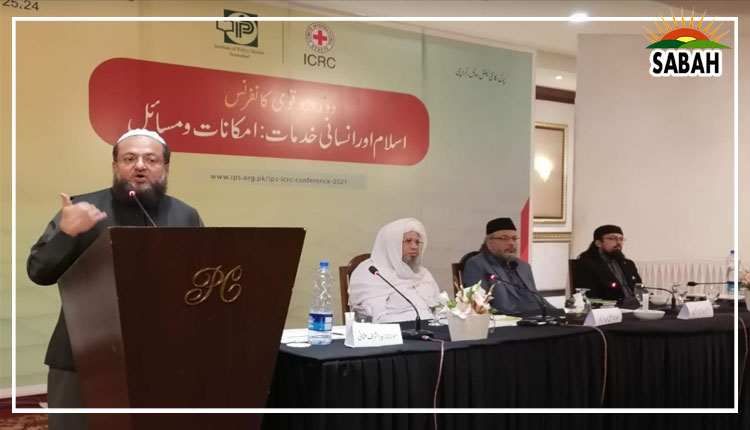
The conference, which was attended by heads and representatives of several national and international social organizations. was participated by researchers belonging to different universities, seminaries and social welfare organizations from across the country who presented their dissertations.
On the concluding day of the conference, President of Al-Khidmat Foundation Pakistan Muhammad Abdul Shakoor, Kanwar Waseem, provincial secretary, Red Crescent Pakistan, Professor Dr. Anis Ahmed, vice chancellor, Riphah International University, Islamabad and Maulana Mufti Abdul Raheem, Jamia Rashid Karachi chaired separate sessions.
Dr. Shehzad Channa and Raheela Khan Advocate from Karachi, Dr. Umar Saleem, Dr. Maleeha Zeba Khan and Hafiz Osama Hameed from Islamabad and Aqsa Tasgheer from Lahore presented their papers on the occasion whereas Umair Hassan, head of Islamic Relief UK, Muhammad Abdul Shakoor, Al-Khidmat Foundation, Dr. Muhammad Fayyaz Alam, Dua Foundation, Dr. Shahida Nomani, Shaoor Welfare Trust, Dr. Syed Aziz-ur-Rehman, Umair Siddiqui, member of Council of Islamic Ideology, Maulana Dr. Zubair Ashraf Usmani from Darul Uloom Karachi and Dr. Sohail Akhtar, former president of Pakistan Islamic Medical Association (PIMA) expressed their views following the papers presentation.
Sharing his views, Maulana Jalandhri said that the crux of Islam, according to most credible ulemas, lies in the obedience of the Almighty, following of the Prophet’s teachings and serving of humanity. A living example of this, according to him, could be seen in the form of many humanitarian organizations which are working in the name of Islam and making collective efforts to serve humanity.
He further added that the madrassas and religious seminaries in the country are not only providing religious education to millions of poor, orphaned and needy students, but are also a source of sustenance for them.
Referring to Wafaq-ul-Madaris Alarabia Pakistan, Hanif Jalnadhari said that about 23000 madrassas from all over the country are affiliated with this Wafaq only, benefiting more than 2.5 million students across Pakistan; and this the data from only one Wafaq while other Wafaqs can present the stats of their own. This underscores how these Wafaqs and madaris are playing not only a role of religious educational institutions, but also that of social welfare organizations.
Muhammad Abdul Shakoor, President of Al-Khidmat Foundation Pakistan, said social service organizations including Al-Khidmat are active for humanitarian service in the light of Islamic teachings and are committed to serving people, both Muslims and non-Muslims alike, in Pakistan as well as abroad, without any discrimination or hidden interest.
Dr. Maleeha Zeba Khan, non-resident fellow at IPS and assistant professor at National University of Modern Languages presented an interesting dissertation highlighting that about three quarters of the land is water based and a large number of people have been using these sea routes since times immemorial for maritime trade, fishing and security. The presence of such a large number of people at sea for these various purposes also poses a variety of threats to them in the form of natural disasters such as tsunamis and hurricanes, as well as human trafficking, piracy and other crimes, or accidents involving boats, ships or fishermen. She opined that the humanitarian services rendered within the oceans by law enforcement agencies such as the Pakistan Maritime Security Agency must also be appreciated.
Addressing the session, Mufti Abdul Raheem said the solution to the problems being faced by humanity lies in following the path set by the Holy Prophet (PBUH), and stressed the need for eradicating depression and anxiety in today’s world.
Referring to the minorities, he warned if non-Muslims living in Pakistan are insecure then the Muslims across the globe would also be in distress. He underlined the importance of human compassion in Islam by saying that even in times of war, the agreements made with the infidels were implemented in letter and spirit and the infidels were also helped in their difficulties when needed. He deplored the gulf of misunderstanding lying between seminaries and NGOs and believed that this mistrust must to be bridged.
Concluding the conference, Dr. Ziaullah Rahmani, regional advisor, ICRC, and Khalid Rahman, Chairman, IPS, thanked the participants and hoped such endeavors would continue in the future as well.


